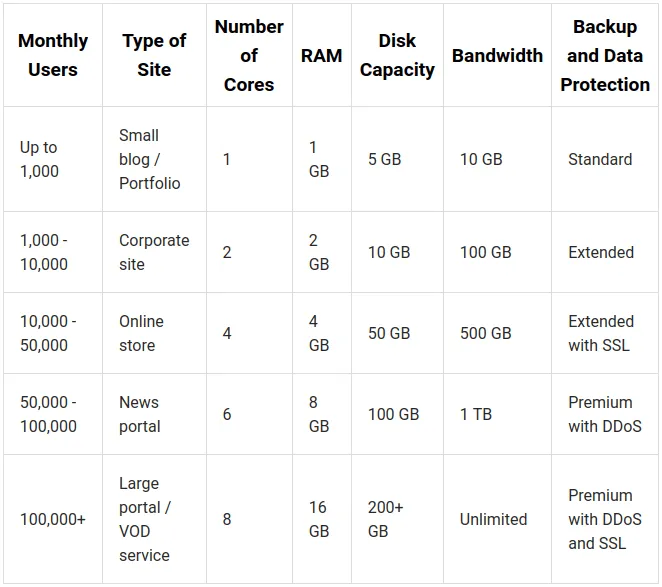Introduction
Why choosing the right hosting is important?
Choosing the right hosting is one of the more important decisions when creating a website. Hosting affects the loading speed of the page, online availability, and data security.
A fast and reliable website increases user satisfaction, which translates into a higher position in Google search results and greater conversion.
Understanding Your Needs
How to identify the needs of your website
Understanding the needs of your website is the first step to choosing the perfect hosting.
Consider what kind of content you will be publishing, what the anticipated amount of traffic is, and whether you need specialized solutions, such as support for specific programming languages or databases.
Differences between types of hosting
Hosting is divided into several main types: shared, VPS (Virtual Private Server), dedicated, and cloud.
Shared hosting is a good solution for smaller sites, VPS offers more flexibility, dedicated hosting provides maximum control and performance, and cloud offers scalability and resilience to failures.
What to pay attention to when choosing a hosting provider
When choosing a hosting provider, pay attention to speed, reliability, the level of technical support, and additional features such as backups and security.
Check reviews from other users and compare prices, but remember that the cheapest offer is not always the best.
A thorough understanding of your site's needs, a conscious comparison of available options, and choosing a provider that best meets your requirements will provide you with a solid foundation for building an online presence.
Technical Parameters and Features
Important technical features of hosting
The choice of hosting should be well-considered. Key technical features to pay attention to include primarily page loading speed, disk capacity, data throughput, and support for the technologies your site uses (e.g., PHP, MySQL).
Loading speed affects user experience and search engine ranking, while adequate data capacity and throughput ensure that your site will operate smoothly, even with high traffic.
Comparison Table
Let's re-examine the recommended technical parameters for hosting servers, considering more realistic examples of websites and the appropriate number of monthly users. We also adjust the number of processor cores and RAM to match the actual needs.

This table presents more realistic examples of applications for different types of websites and suggested technical hosting parameters depending on the expected number of monthly users.
Pay attention to the "Backup and Data Protection" column, which indicates the level of security and backups available within the hosting range.
This is a key element that can significantly impact the security and reliability of your website, especially in the event of unexpected failures or attacks.
Additional features that may interest you
In addition to basic technical parameters, it's worth paying attention to additional features offered by hosting providers.
Options such as an SSL certificate (ensuring the security of transmitted data), automatic backups (protecting against data loss), access to visit statistics, or 24/7 technical support can greatly facilitate website management and enhance its security and usability.
When choosing hosting, consider which of these additional features are most important to you and ensure that your chosen provider offers them. This way, your website will not only be fast and available but also secure and easy to manage.
Security and Technical Support
How hosting affects the security of your site
Choosing a hosting provider significantly impacts the security of your website.
Good hosting companies offer integrated security solutions such as SSL certificates, DDoS attack protection, regular vulnerability scanning, and intrusion prevention systems.
All these help protect your site from unauthorized access, data theft, and other cyber threats.
Technical support and customer service
The quality of technical support and customer service is as important as the technical parameters of hosting.
Check if the chosen provider offers 24/7 technical support, your preferred communication channel (phone, chat, email), and if they have resources like a knowledge base or community forum where you can find answers to frequently asked questions and solve potential problems.
Pricing Plans and Agreements
Cost analysis: hidden fees and pitfalls
When choosing a hosting plan, pay attention to the "fine print" and hidden fees.
Some providers may offer low prices in their initial offers but later add fees for additional services such as backups, SSL certificates, or even an increase in bandwidth limit. Make sure you know the full cost of the service before signing a contract.
Understanding the contract and the flexibility of plans
Read and understand the terms of the agreement with your hosting provider. Check if the agreement allows for flexibility, such as easily scaling your plan up or down according to your site's needs. Also, find out the conditions for renewal and cancellation of the service to avoid unpleasant surprises in the future.
When choosing hosting, remember that not only the price but above all, security, reliability, and quality of service should be the key criteria for selection. Well-chosen hosting is the foundation of your online presence's success.
Future Scalability and Technology Support
The ability to develop your site and increase resources
When choosing hosting, consider the future scalability of your site. The ideal provider should offer flexible plans that allow for easy resource scaling, such as disk space, bandwidth, and access to additional services as soon as your site begins to attract more users. This way, instead of transferring your site to another provider, you'll be able to easily adjust your current services to meet growing needs.
Support for new technologies
Make sure that the chosen hosting supports the latest technologies. This is not just about supporting the latest versions of programming languages like PHP or JavaScript but also the availability of modern solutions, such as cloud-based servers, containerization, or support for serverless technologies. This will allow you to take advantage of the latest trends in web development and applications, which can give you an edge over the competition.
Summary and Best Practices
How to make the final decision?
Making the final decision on choosing hosting requires balancing several key factors. Compare offers, paying attention not only to price but also to the quality of technical support, user reviews, offered resources, and flexibility in management and scaling of services. Consider also how the hosting provider fits into your long-term site development plans.
Best Practices:
- Compare offers: Don't focus on one offer; compare at least a few different providers.
- Check reviews: Look for reviews from other users and reviews to get a better picture of the quality of services.
- Test technical support: Check how quickly and professionally the provider responds to your questions.
- Plan for the future: Choose hosting with future development and potential technological needs in mind.
- Read the contract : Pay attention to the terms of the agreement, especially the provisions regarding service renewal and any fees for additional resources.
Remember, choosing the right hosting is an investment in the future of your site. By making an informed decision, you gain a stable foundation for developing your online presence.
FAQ
Can I change my hosting plan at any time?
Yes, most hosting providers allow you to change your hosting plan at any time. You can scale your resources up or down depending on the current needs of your website. This is useful when your site is gaining popularity and needs more resources.
What is an SSL certificate and why is it important?
An SSL (Secure Sockets Layer) certificate is a standard security technology that ensures encrypted communication between a web browser and a server. This is a key element in protecting personal data, financial transactions and building user trust in your website. Google also prefers websites secured with an SSL certificate, which may affect positioning.
What is bandwidth and how does it affect my site?
Bandwidth, often called data transfer, determines the amount of data that can be sent from the server to your site's users in a given period of time, usually a month. Insufficient bandwidth can cause the page to load slowly or even become unavailable when the limit is exceeded.
Is shared hosting a good choice for my website?
Shared hosting is an economical solution for small websites and blogs that do not generate much traffic. However, if you expect a rapid increase in traffic or if your website requires advanced features, you may want to consider VPS or dedicated hosting.
What are the differences between VPS and dedicated hosting?
VPS (Virtual Private Server) hosting provides dedicated resources on a shared server, offering better performance than shared hosting at a lower cost than a dedicated server. Dedicated hosting offers full control over the physical server and is recommended for large websites requiring maximum performance.
Do I need technical knowledge to manage hosting?
It depends on the type of hosting. Many hosting services offer a management panel that makes it easier to perform basic tasks. However, with more advanced solutions such as dedicated servers, some technical knowledge may be required. It is worth choosing a supplier that offers solid technical support.
How often should I back up my website?
It is recommended that you back up your website regularly, preferably daily, especially if your website is updated frequently. Many hosting companies offer automatic backup solutions, which can make the process much easier.
Does hosting affect my website's SEO?
Yes, your choice of hosting can impact SEO. Factors such as page loading speed, uptime and server location may affect the positioning of your website in search engines. It is good to choose a hosting that provides fast and reliable services.

Adam Dowgird



